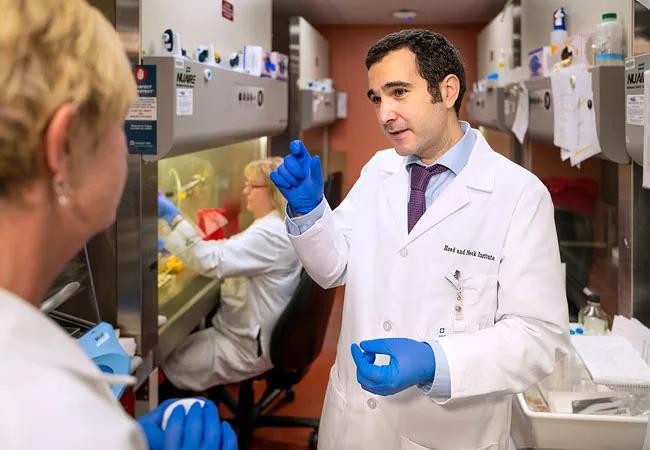The Head & Neck Institute will make its initial footprint in the newly constructed BioRepository building

A research effort, spearheaded by Mohamad Chaaban, MD, Research Director of the Head & Neck Institute at Cleveland Clinic, will investigate the impact of obesity on chronic rhinosinusitis (CRS)—a common sinus condition that affects approximately 31 million in the U.S. and has an estimated annual cost of six billion dollars.
Advertisement
Cleveland Clinic is a non-profit academic medical center. Advertising on our site helps support our mission. We do not endorse non-Cleveland Clinic products or services. Policy
Dr. Chaaban and colleagues recently received Cleveland Clinic’s 2023 BioRepository Award for their proposal “Influence of Obesity on Chronic Rhinosinusitis.”
This is the first time the Head & Neck Institute will be a part of the newly constructed BioRepository building. Opened in 2021, this 22,000-square-foot facility stores biological samples that can be used by investigators from multiple disciplines across the Cleveland Clinic enterprise and nationwide.
As leaders in the field of sinus research and treatment, the Head & Neck Institute will have a dedicated BioRepository to assist with consent, tissue handling, and processing. Head & Neck Institute samples will be available for interdisciplinary research, including pulmonary, allergy and inflammatory diseases related to chronic sinusitis.
“The BioRepository is the future of precision of medicine,” notes Dr. Chaaban. “It is invaluable because it leverages the collaborative work between different disciplines. If you look at this particular project — and other projects — there are a number of specialties involved. The BioRepository promotes innovation and discovery. In the case of our study, it allows us to work together to gain a better understanding of the influence of obesity on chronic rhinosinusitis.”
While the evidence has shown that obesity is a major disease modifier among children and adults with asthma, its impact on chronic rhinosinusitis remains unclear. Recognizing this, Dr. Chaaban is leading research aimed at improving our comprehension of the connection between obesity and chronic rhinosinusitis.
Advertisement
Dr. Chaaban notes that the nature of these studies limits our understanding of the underlying mechanisms. “Obesity-related asthma is well characterized, however, the association between obesity and chronic rhinosinusitis has been limited to few retrospective studies,” he explains.
Obesity is a public health concern that affects multiple comorbid conditions, emphasizes Dr. Chaaban. “In the ENT community, for instance, obese patients have increased sleep apnea, severe asthma, and increased risk of spontaneous CSF leak,” he says. “My current work takes a closer look at chronic rhinosinusitis — one part of a bigger puzzle.
“With our biorepository grant, we are able to collect all sinonasal tissue from sinus surgeries for chronic rhinosinusitis performed at the Head & Neck Institute. We will also be able to collect normal sphenoid sinus epithelium that is currently being removed and wasted during pituitary surgery will be used for the control samples. Patients will be recruited during their surgical consent,” explains Dr. Chaaban. They will be asked to complete a sinonasal quality of life questionnaire, including a validated sinonasal outcome test (SNOT-22) preoperatively and postoperatively at regular routine follow-up intervals.
Podcast content: This podcast is available to listen to online.
Listen to podcast online (https://www.buzzsprout.com/2241209/13504201)
Advertisement
Advertisement

Complex disease requires a comprehensive approach

New papers review the data and provide guidance on antiobesity medications and other options

Patient loses 148 pounds in 18 months, reduces BMI to 26

Comprehensive approach can make a transformative impact

Positive emotions, low impulsivity appear to safeguard against weight gain, other comorbidities

Findings highlight an association between obesity and an increased incidence of moderate-severe disease

Perserverance may depend on several specifics, including medication type, insurance coverage and medium-term weight loss

New research adds to understanding of an understudied link